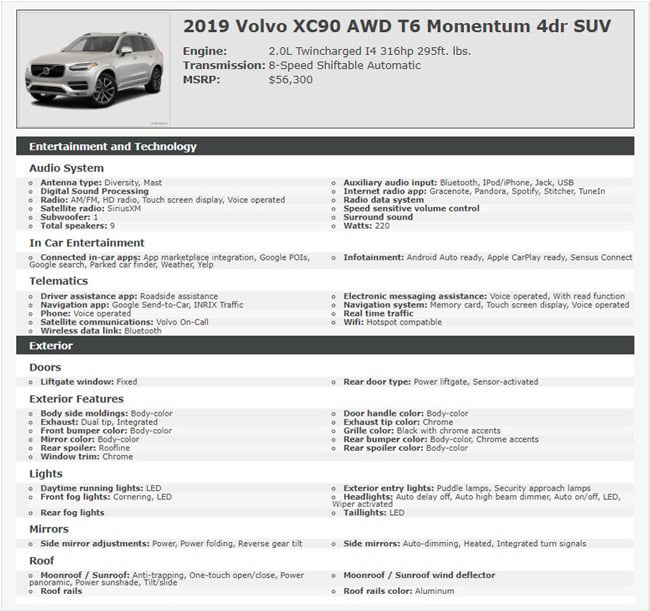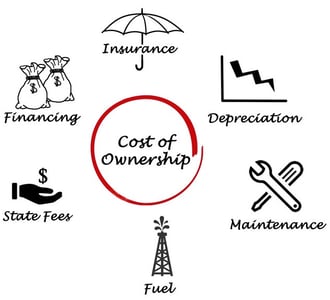

Aug 19 2015
Over the last 5 years, there has been a paradigm shift in marketing and advertising across all industries. The "spray and pray" method, hammer everyone with promotional content and hope it sticks, is finally fading, as businesses become more strategic in their messaging.
When it comes to vehicle marketing and sales, there is certainly no “one-size-fits-all” approach. Vehicle shoppers are unique in their budgets and vehicle needs. It’s important that dealerships understand their audience and are equipped with accurate vehicle data to effectively market their inventory and aid purchase decisions.
A dealership that takes a data-driven approach has the best chance of properly targeting qualified leads, as well as creating attractive content and offers that will engage prospective buyers and re-engage former customers.
Below we’ve shared with you five types of automotive data, both consumer and vehicle related, that will significantly improve your dealership’s marketing ROI and increase vehicle sales.
There are a number of data solutions that offer valuable consumer data to more accurately target your vehicle marketing and increase sales. Here are a few consumer data points that benefit dealerships a great deal:
Demographic and behavioral data should come as no surprise. In fact, these were probably the first data points you were envisioning upon reading the headline.
In order to maximize your ROI, it’s essential that you know your audience and their behavior. Although it’s easy to make a hypothesis or go with your gut feeling, referencing data is always a safer and more effective approach for accurately defining your audience. Demographic and behavioral data will help your dealership identify consumer trends to best target your marketing campaigns.
Experian and Dataium are two of the major players in the automotive data sector that provide this information. Experian helps identify prospective buyers by providing the highest-quality demographic, transactional and behavioral information resources. Dataium is primarily focused on aggregating vehicle shopping behavior data, such as links clicked, pages viewed, and form fields selected or filled out, and analyzing it to predict future sales trends.
Monitoring your social media feeds and engagement history is another great place to gain insight on vehicle shopper demographics and behavior. After all, social media is designed for consumers to be social, which results in valuable consumer data right at your fingertips. Your dealership can analyze what type of content or offers are most attractive to your social media followers, or which demographics your brand tends to resonate with the most.
There are several social media solutions -- Hootsuite and Buffer to name a couple -- that allow you to monitor brand and keyword mentions in real-time and join the conversion, as well as onboard analytics to gain more marketing intelligence.
Historic customer data is also a great resource for predicting future trends. It will help channel your marketing energy into consumers that share similar characteristics with your most profitable customers. Referencing customer data isn’t just valuable to your dealership marketing, but also for customer retention. Let’s not forget that purchasing or leasing a vehicle is unlikely a one-time affair for most of your customers. The best way to retain your customers is by marketing maintenance and service, while monitoring their current vehicle situation for a timely new vehicle offer.
To access historic customer data, most dealers can rely on their CRM and/or DMS for the analytics necessary to predict future trends. In addition, there are several companies, such as Dominion Dealer Solutions and Dealertrack that offer equity mining products to determine when customers have equity in their car and are in the position to buy or lease a new one.
Equity mining solutions will help catch customers before they begin shopping around for a new car. In some cases, the thought of buying a new car may not have entered their minds yet, but offering an upgrade at no additional cost is pretty attractive to many customers. As Dominion states, “Your customers make the best prospects.”
Consumer data, while a very important piece of target marketing, is not the only data necessary to effectively market inventory and increase vehicle sales. There are several types of vehicle data, in addition to consumer data, that are valuable for dealerships. Here are a few of them:
Every vehicle shopper has their own list of criteria that defines the perfect match for their next car. Implementing a vehicle data solution that can provide accurate vehicle descriptions, specifications and some other popular vehicle details (ie: fuel economy, safety ratings, awards) is crucial to creating successful vehicle marketing campaigns and engaging vehicle detail pages (VDPs) on your website.
Ideally the vehicle data solution your dealership employs will easily integrate with your inventory listings through a web service API or flat file. This data should also be easily accessible for your marketers and sales team by means of VIN decoding or YMMT look-up options. For all marketing efforts, including email campaigns, paid advertising, or social media content marketing, it's important that your marketers are able to identify each vehicle's features that they are highlighting for prospective buyers.

DataOne offers a few different vehicle data products and solutions that are great for managing inventory, supporting your dealership’s vehicle marketing campaigns, and offering the best experience possible for vehicle shoppers on your website.
As I’m sure you are well aware of, used vehicle inventory is one of the breadwinners for many dealerships, along with their fixed ops department, as they both have a much larger profit margin than new vehicles. If you are in the business of selling used vehicles, it’s essential that your dealership has access to vehicle history data. Vehicle history reports will help your dealership maintain a high-quality used inventory and will give your prospects peace of mind. Although providing this data for leads is not free for the dealership, it’s worth offering complimentary vehicle history reports to high-intent shoppers.
There are a number of vehicle history reporting services your dealership can use. Carfax and AutoCheck by Experian are the two biggest names. For dealers looking to explore other options, CarHistory.us.org, NMVTIS, and InstaVIN are a few other vehicle history report providers.

“A car is the second largest purchase a consumer will make.” You’ve probably heard someone say this at one point or another. Purchasing a vehicle can be very costly… often more costly than we anticipate --especially for first-time vehicle owners.
The initial purchase of a vehicle is just the beginning. There are many additional expenses that surface along the way. Access to data that will better inform vehicle shoppers of what to expect throughout the years of ownership is a great asset for dealerships. Vehicle marketers can utilize this data to target certain demographics, and sales reps can reference this data to present a bigger picture of total costs to own when closing deals.
There are a few major cost-of-ownership vehicle data solutions, including Kelley Blue Book (KBB), IntelliChoice, and Vincentric. Each of these solutions has several common data points that they take into account when determining the costs of ownership (generally over the course of 3-5 years) for all vehicle models. These data points include depreciation, fuel, state taxes and fees, insurance, maintenance, repairs, and financing interest. Keep in mind that total cost-to-own is an estimate, given that there are several variables, including driving habits, insurance risk, credit scores, and state fees.
There’s no need to guess who your audience is, or wait for customers to return to your dealership with such a wide variety of automotive data solutions available for implementing. A data-driven approach is much more effective. Make sure your dealership has looked into all of these options to drive as many actionable leads as possible that will ultimately result in more revenue for your business.
Photo Credits: Brian Robert Marshall (some changes were made), W. Robert Howell, Pixabay